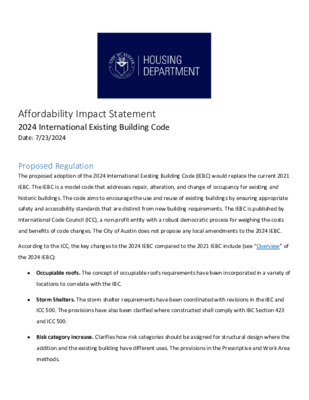Afforbability Impact Statement- IEBC — original pdf
Backup

Affordability Impact Statement 2024 International Existing Building Code Date: 7/23/2024 Proposed Regulation The proposed adoption of the 2024 International Existing Building Code (IEBC) would replace the current 2021 IEBC. The IEBC is a model code that addresses repair, alteration, and change of occupancy for existing and historic buildings. The code aims to encourage the use and reuse of existing buildings by ensuring appropriate safety and accessibility standards that are distinct from new building requirements. The IEBC is published by International Code Council (ICC), a non-profit entity with a robust democratic process for weighing the costs and benefits of code changes. The City of Austin does not propose any local amendments to the 2024 IEBC. According to the ICC, the key changes to the 2024 IEBC compared to the 2021 IEBC include (see “Overview” of the 2024 IEBC): • Occupiable roofs. The concept of occupiable roofs requirements have been incorporated in a variety of locations to correlate with the IBC. • Storm Shelters. The storm shelter requirements have been coordinated with revisions in the IBC and ICC 500. The provisions have also been clarified where constructed shall comply with IBC Section 423 and ICC 500. methods. • Risk category increase. Clarifies how risk categories should be assigned for structural design where the addition and the existing building have different uses. The provisions in the Prescriptive and Work Area • Smoke compartment requirements. Existing Group I-1, condition 2 occupancies and ambulatory care facilities may be required to divide stories into no fewer than two smoke compartments for more substantial additions and alterations. • Adult Changing stations. Where additional toilet facilities are being added and IBC Section 1110.4.1 would require adult changing stations, Section 306.7.15 would require that at least one accessible family or assisted use toilet room is required to contain one. • Exterior wall covering and wall envelopes sprinkler requirement. Section 309.2.1 has been added to require that if combustible exterior wall envelopes or coverings are installed on a high-rise building the building must be equipped throughout with a sprinkler system. There are some exceptions for smaller installations and when only a combustible water resistive barrier is installed. • Performance method renumbering. Though editorial in nature, Chapter 13 was renumbered to assist in the useability of that method. • Owners’ responsibility at construction sites. Section 1502 was added to address the need for the owner to properly develop, implement and maintain a site safety plan during construction. A site safety director must be designated and is responsible to conduct daily fire safety inspections. • Non required automatic sprinkler system. A section has been added to Chapter 10 under the change of occupancy classification requirements to allow the removal of a nonrequired existing automatic sprinkler system. This section includes a number of criteria that must be met. • APPENDIX E TEMPORARY EMERGENCY USES. This new appendix was created to provide guidance for designers, engineers, architects and fire and building officials to allow temporary emergency uses of existing buildings with respect to the minimum code requirements. This appendix is intended to serve as a template or checklist for use during an emergency that references the relevant code requirements. Land Use/Zoning Impacts on Housing Costs The proposed changes would have a neutral impact on housing costs via land use and zoning. Impact on Development Cost The proposed changes would have a neutral impact on development costs overall. Roughly 26 changes to the code appear to affect construction costs. Roughly 10 of these may decrease costs, and 16 may increase costs to varying degrees. Overall, the ICC weighs each change based on cost, safety, accessibility, and clarity. The ICC code changes that increase construction costs generally have significant benefits for safety, accessibility, and clarity of code language. Impact on Affordable Housing The proposed changes would have a neutral impact on affordable housing. City Policies Implemented None. Other Housing Policy Considerations None. Manager’s Signature